-
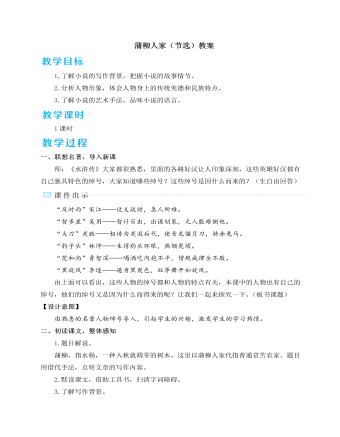
人教部编版语文九年级下册蒲柳人家(节选)教案
刘绍棠,中国当代著名乡土文学作家,1936年2月出生于河北通县(今北京通州区)大运河畔的儒林村,1949年开始发表作品,一生留下了500多万字的乡土文学作品,包括《地火》《京门脸子》等多部长篇小说,《蒲柳人家》《运河的桨声》等多部中篇小说,以及《青枝绿叶》《蛾眉》等多部短篇小说集。他的作品在国内多次获奖,在国际上亦有影响。刘绍棠的作品内容各不相同,但都艺术地再现了其家乡大运河畔不同历史时期的风土人情和社会风貌,描绘了充满诗情画意的乡风水色、世俗人情。20世纪80年代以来,刘绍棠不遗余力地倡导乡土文学,创作上坚持“中国气派,民族风格,地方特色,乡土题材”。文学评论家指出,他的作品格调清新淳朴,乡土色彩浓郁,形成了独具特色的大运河乡土文学风格。
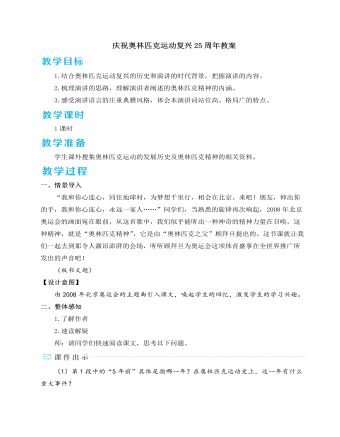
人教部编版语文八年级下册庆祝奥林匹克运动复兴25周年教案
(3)推荐男女生代表各一位在全班进行演讲展示。 (4)围绕“讲”和“演”两方面的技巧,点评演讲效果。(生开展演讲活动,师指导)【设计意图】本环节通过集中梳理演讲技巧,并设计演讲技巧进行演讲展示,引导学生将理论知识逐步运用于具体的演讲实践中,提高学生的演讲能力。五、总结存储1.教师总结现代奥林匹克运动的创始人顾拜旦面对世界政治格局剧变的局面,以战略家的视野指出奥林匹克精神的内涵与价值,用诗歌般的语言阐述了奥林匹克平和自信的内涵,提出了奥林匹克运动的宗旨是教育,是面向大众,是促进和平、公平、公正。他激情澎湃地畅想美好前景,确信奥林匹克精神必将如阳光般普照大地。整篇演讲词站位高、格局广,语言庄重、典雅,值得我们用心体会。2.布置作业学校即将举行春季运动会,如果你被邀请在运动会的开幕式上作为学生代表发言,你将如何演讲?结合你对奥林匹克运动的精神的理解,写一篇300字左右的演讲词,并适当设计一些演讲技巧。
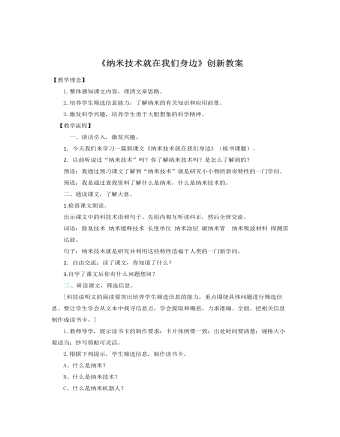
部编人教版四年级下册《 纳米技术就在我们身边》创新教案
【教学理念】 1.整体感知课文内容,理清文章思路。2.培养学生筛选信息能力,了解纳米的有关知识和应用前景。3.激发科学兴趣,培养学生勇于大胆想象的科学精神。【教学流程】一、谈话引入,激发兴趣。1.今天我们来学习一篇新课文《纳米技术就在我们身边》(板书课题)。2.以前听说过“纳米技术”吗?你了解纳米技术吗?是怎么了解到的?预设:我通过预习课文了解到“纳米技术”就是研究小小物质新奇特性的一门学问。预设:我是通过查找资料了解什么是纳米,什么是纳米技术的。二、通读课文,了解大意。1.检查课文朗读。出示课文中的科技术语和句子。先组内相互听读纠正,然后全班交流。词语:除臭技术 纳米缓释技术 长度单位 纳米涂层 碳纳米管 纳米吸波材料 探测雷达波。句子:纳米技术就是研究并利用这些特性造福于人类的一门新学问。2.自由交流:读了课文,你知道了什么?

人教版新目标初中英语七年级下册How was your weekend教案2篇
Teaching Goal:1. General aims:Talk about recent past events2. Particular aims:A. Language Focus.Talk about recent past events and think of the past events.B. Language goalsHow was….?It was …What did …do over the weekend?C. Language structures:(1). How was your weekend? I was great. Pay attention to no form.(2). What did you do over the weekend? I played soccer. We went to the beach.D. Useful words and phrases:Words: was, did, went, beach, over, project, test, wasn’t, false, number, geography, spend, week, most, mixture, their, had, little, cook, read, saw, change, everyone, sit, sat, no, anythingPhrases: did one’s homework, played soccer, cleaned my room, went to the beach, played tennis, went to the movies, on Saturday morning, over the weekend, cook … for, what about, do some reading, have a party, talk show, go shoppingE. Grammar language:Present simple past tenseRegular and irregular verbsF. Learning strategies:Tour and holidaysG. Interdiscipinary:H. Emotion and manner:Teaching time: 5 periodsTeaching procedures:Period One教学步骤、时间 教师活动 学生活动 媒体应用Step 1Free talk 3’ Ask some questions like:Who’s on duty today?What’s the weather like? Answer and talk about something.让同学们回答下列问题1. Do you like weekend? (Let some students answer)It takes them three minutes to talk about the question.2. Why do you like weekend? (let the students answer) Most of the students like the weekend此时教师用汉语问:“在周末期间问你干了什么?这句话用英语这么回答?Let the students guess.At last the teacher give them right answer3. What did you do over the weekend?(板书、学习)

人教版新目标初中英语七年级下册Where is the post office教案2篇
Period 2 (3a----Section B 2c)Preview(Pre-task): Key points: What laAdd another information about their pen pals----their language on the cardnguage does she/he speak?She/He speaks....Does she/he have any brothers and sisters? Does she/he speak English?Preview(Pre-task): Add another information about their pen pals----their language on the cardKey points: What language does she/he speak?She/He speaks....Does she/he have any brothers and sisters? Does she/he speak English?Step 1 Revision1.Revisionand dictation of the new words 2.Revise the drills they learned yesterday.(by pairwork and grammar exercise)Step 2 Leading-inT has a conversation with one student. The conversation is following:---Do you have a pen pal?---Yes, I do.---What's your pen pal's name? ---His/Her name is....---Where is your pen pal from? ---He/She is from...---Where does he/she live? ---He/She lives in....---What language does he/she speak?He/She speaks...Write the new words on the Bb. They are following: EnglishChineseJapaneseFrenchStep 3 LearnLearn the new words with the whole class.Finish 3a with the students3b Pairwork T still does an example with one student Then the Ss practise in pairs. The example is following:--Curry Muray is my pen pal. He is from the United States.---What language does he speak?
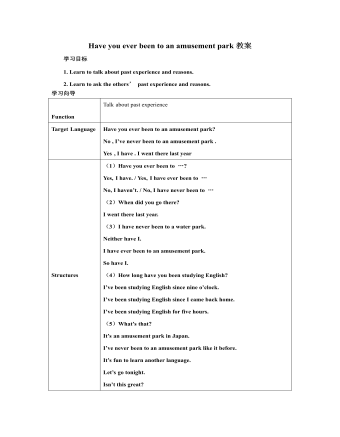
人教版新目标初中英语八年级下册Have you ever been to an amusement park教案
(1)Have you ever been to …? Yes, I have. / Yes, I have ever been to …No, I haven’t. / No, I have never been to …(2)When did you go there? I went there last year. (3)I have never been to a water park. Neither have I. I have ever been to an amusement park. So have I. (4)How long have you been studying English? I’ve been studying English since nine o’clock. I’ve been studying English since I came back home. I’ve been studying English for five hours. (5)What’s that? It’s an amusement park in Japan. I’ve never been to an amusement park like it before. It’s fun to learn another language. Let’s go tonight. Isn’t this great?space museum, amusement park, water park, South America, Peru, Holland, European culture, tour guide, flight attendant, musical instrument, more than, be from, get to, take lessons, neither, discover, graduate, change

人教版新目标初中英语八年级下册It’s a nice day, isn’t it教案2篇
"Hello! Welcome to English class! Introduce yourself. Meet your new classmates." That's what the teacher says. What do you say? "Oh no!" It can be difficult talking to new people. But it can be fun, and you can make friends. How do you do it? Make small talk. Small talk is polite conversation. "Wang Nan is a great pingpang player, isn't she?" "I'd love to meet her, wouldn't you?" "It's been raining a lot, hasn't it?" Tag questions are a form of polite speech. To make small talk successfully, you should know how to make them. You should also know what topics to talk about. Try to learn this unit carefully. The next time you're in English class, you'll find out. Making small talk's easy, isn't it? (“你好!欢迎你!请做一下自我介绍。认识一下你的新同学。”通常在课上老师会这样说。你会说什么呢?“噢,不!”与陌生人谈话太困难了。但是这也很有意思,并且你还能交到朋友。你该怎么做呢?闲聊。闲聊指得是礼貌的对话。“王楠是一个很棒的乒乓球运动员,不是吗?”“我希望自己能认识她,你呢?“今年的雨水很多,不是吗?”反意疑问句是一种礼貌用语。为了使得谈话成功,你应该知道怎样去进行闲聊。你还应该知道与不同的人该谈论什么样的话题。认真的学习这个单元吧,下次在英语课上,你会发现与大家展开谈话是一件很容易的事情,不信我们来试试。)

人教版新目标初中英语八年级下册How long have you been collecting shells教案2篇
Step Ⅱ Show the new words on the screen and teach the new words. Read the new words to students and ask them to repeat.Step Ⅲ 3aThis activity introduces new vocabulary and provides reading practice using the target language.In this activity first look at the four pictures.T: What can you see in the pictures?Ss: Four snow globes.T: Right. There are four snow globes in the pictures. And what are they?Ss: They are a monster, two polar bears, two penguins and a birthday cake.Write these words on the blackboard: snow globe; monster; polar bear; penguin and birthday cake. Read them to the class and ask students to repeat each one. Make sure students understand each word.Use a computer to show the E-mail message on the screen and read the message to students.Get students to read the e-mail on their own, and then draw lines connecting each snow globe and its description.Correct the answers.AnswersA line should connect each snow globe picture with the words that describe it in the letter.Step Ⅳ 3bThis activity provides writing practice using the target language.First review Activity 2a on Page 47.Then ask students to complete the message according to Activity 2a.Some partial sentences are given to students. Write about one person's collection.When students work, walk around the room checking the progress and offering help as needed.When they finish, ask some students to read their messages to the class.
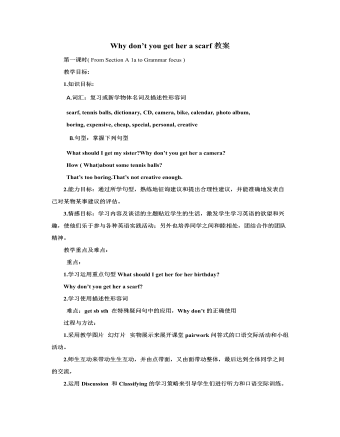
人教版新目标初中英语八年级下册Why don’t you get her a scarf教案
教师带领学生复习有关描述宠物的词汇,采用教师提问学生回答的方进行。如:T:What animals do you think would be good pets?What animals do you think would be bad pets?What do you think are good animals for a six-year-old child?然后学生进行 pairwork 练习。Task two: 师生互动,学习探究 1、播放3a部分的录音,引导学生一边听录音,一边跟读。2、通过听录音学生回答以下问题:Why do you think pot-bellied pigs are popular?What are the advantages and disadvantages of keeping such a pet?教师对学生的回答进行及时点评。3.学习范文,学习重点短语,为下步的模仿写作提供语言素材。T :1. )Have you ever kept a pig as a pet?Do you like pigs? St.:No.…Why don’t you like to keep a pig? St: No.They’re too dirty and lazy(Do you know in some foreign countries like Hollyland, Australia,pigs are the most popular pet.there’s a kind of pig.(图)it has an interesting name? it ‘s called a pot-bellied pig.) Now,let’s learn an article about this kind of interesting pet.2.)play the tapeSt.:Listen and repeat3.)show some Qs on computer(本子St.: read silently,then answerthe Qs(本子)4.)Ask ss. Close book and retell this passage.(what is a pot-bellied pig? Is it a good or bad pet? ) St.: retell it to each other“A pot –bellied pig is a popular pet now…”5.read the article together.St.:.practice reading
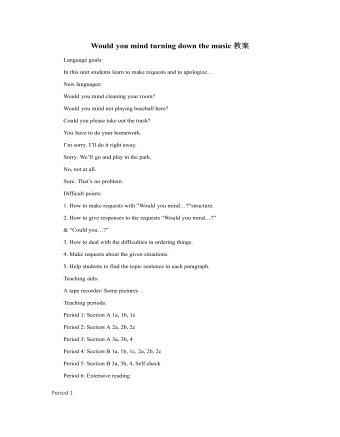
人教版新目标初中英语八年级下册Would you mind turning down the music教案
Step 4. Group work (4)1. Ask a pair of students to read the dialogue. Say, This activity provides speaking, listening and writing practice using the target language.2. Ask students to complete the work in groups.3. Check the answers with the whole class. 4. Explain some of the language points. Step 5. Word review (Self check 1)1. Ask students to read the words and the phrases given. 2. Fill in the blanks with proper forms of these words to complete the sentences. 3. Check the answers with the whole class. Homework:Do activity 2 on page 57 after class. Period 6Teaching aims: 1. Teach vocabulary words and the useful expressions. 2. Enable the students to learn etiquette in different culture. 3. Help the students learn how to behave politely in public places and in daily life. Teaching procedures:Step 1. RevisionHelp students to review the function of making requests through a free talk. Then lead them to the topic of etiquette. Explain the meaning of etiquette. Or, ask students to look it up in the dictionary. Step 2. Pre-reading (Section 1)1. Ask students to read the picture and make a list with their partner about how many rules of etiquette can be seen being broken.

人教版新目标初中英语九年级下册By the time I got outside, the bus had already left教案
Ⅰ. Teaching Aims and Demands1. Knowledge Objects(1) Key Vocabularyoversleep(2) Target LanguageWhat happened?I overslept. And by the time I got up, my brother had already gotten in the shower.2. Ability Objects(1) Teach the students to use the new words.(2) Train the students to narrate past events with the Past Perfect Tense.(3) Train the students' listening and speaking skills with the target language.3. Moral ObjectIt’s a good habit to go to bed early in the evening and get up early in the morning. So you’ll never be in a hurry in the morning.Ⅱ. Teaching Key Points1. Key Vocabularyoversleep2. Target LanguageNarrate past events with the Past Perfect TenseⅢ. Teaching Difficult Points1. Train the students to narrate past events with the Past Perfect Tense.2. Train the students to understand the target language in spoken conversation.Ⅳ. Teaching Methods1. Thinking of examples from the students' real lives.2. Making sentences by looking at the pictures.Ⅴ. Teaching AidA tape recorderⅥ. Teaching ProceduresStep I Revision1. Revise the language points in Unit 8.Ask some questions like this: What volunteer work would you like to do?Help the students to answer, I’d like to…/I love to…/I hope to2. Practice the dialogue in Activity 3c on page 62 again. Get students to role play the similar dialogues with the following.

人教版新目标初中英语九年级下册Rainy days make me sad教案
1. 教材分析本单元以how do things affect you?为话题, 从颜色、天气、音乐、广告、产品等方面谈论了外界事物如何影响人的心情。要求学生掌握表达某物或某事给人带来的感觉、看法或影响等。共设计了四个部分的内容:Section A 该部分有4个模块:第一模块围绕Which restaurant would you like to go to?这一话题展开思维(1a)、听力(1b)、口语(1c)训练;第二模块围绕How does music affect you? 进行听力(2a-2b)、口语训练(2c);第三模块继续围绕how do colors in the restaurant affect you这一话题展开训练,训练形式为阅读和问题体验(3a)和小组活动(3b);第四模块仍就How do things affect you这一话题以调查的形式展开讨论。Section B该部分有4个模块:第一模块围绕产品广告对人们的影响这一话题以“配对”(1a)与“列举”(1b)两种形式展开训练;第二模块继续围绕How do things affect you? 进行听力(2a-2b)、口语对话训练(2c);第三模块围绕“Advertising”这一话题展开阅读(3a-3b)和写作(3c)训练;第四模块围绕How posters affect you这一话题以口语训练形式展开小组活动。

人教版新目标初中英语九年级下册I’ll help clean up the city parks教案
Talk about offering help (P60)I’ll help clean up the city parks.A: I’d like to work ...B: You could help ...Talk about ways to tell people about the Clean-Up Day (P61)We need to ...We can’t ...I’ll ...Talk about the work the volunteers do (P62)These three students all volunteer their time to help other people.Somebody loves to ... / helps ... / plans to ... / wants to ...A: What do you like doing?B: I like ... A: What kind of volunteer work do you think I could do?B: You could ...1. 重点词汇advertisement, fix, repair, pleasure, blind, deaf, shut, carry, specially, fetch2. 认读词汇hunger, homeless, cheer, clean-up, sign, establish, major, commitment, elementary, veterinarian, coach, similar, call-in, strategy, disabled, organization, unable, support, appreciate, donation, part of speech, pronoun, adverb, preposition, conjunction, donate, Jimmy, Sally3. 词组clean up, cheer up, give out, put off, set up, think up, take after, fix up, give away, put up, hand out, work out, at once

人教版新目标初中英语九年级下册We’re trying to save the manatees教案2篇
本单元主要围绕着有关濒临灭绝的动物这一话题,学习了应该怎样保护我们的环境,以及就某一问题展开辩论。目标提示语言目标能够运用所学知识,就某一问题展开辩论。认知目标1、复习一些语法:现在进行时、一般现在时、用used to 表示一般过去时、现在完成时、一般过去时的被动语态。2、学会表达同意和不同意。3、学会以下基本句型:We’re trying to save the manatees.Manatees eat about 100 pounds of food a day.There used to be a lot of manatees.In 1972,it was discovered that they were endangered.Some of the swamps have become polluted.情感目标了解一些濒临灭绝的动物的生活习性和濒临灭绝的原因,教育学生应该如何保护环境。教学提示充分利用多媒体等教学设备,创设与本课话题相关的情境,如各种不同种类的动物、动物园以及有关环境的画画等等。围绕着本单元的教学目标,设计一些贴近学生实际的教学任务,如让学生谈论自己最喜欢的动物,如何拯救濒危动物,如何保护环境等等。让学生根据所学知识,就动物园是否对动物有利以及其他的话题进行辩论。
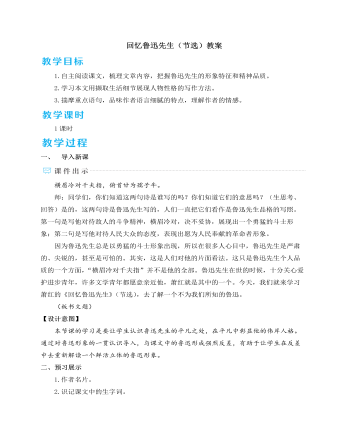
人教部编版七年级下册回忆鲁迅先生(节选)教案
《回忆鲁迅先生》(节选)是一篇典型的有较长篇幅的散文。本教学设计以点带面,长文短教,设计了这样一个问题:“作者在文中为鲁迅先生塑造了多个身份,具体有哪些?”如此化繁为简,使课堂教学脉络清晰。学生在阅读长篇幅文章时有了抓手,就可以有条理地去思考,形成系统性思维,直达教学目标。本教学设计还要求学生进行批注式阅读,直入文本。学生围绕“说说鲁迅先生身上有哪些优秀的品质让学生萧红印象深刻?”做赏析式或者评价式批注,让学生在自读这篇文章时,将无目的阅读变为有效阅读,既提高了课堂效率,也让学生真正做到潜入文字之中,通过关注文章细节来深入把握文本。本教学设计整体上以学生自主学习为主,教师适当引导。遵从“整体感知内容—局部探究—体会情感”的一般阅读规律,以读为指引,让学生在读中感知内容,在读中把握人物形象,在读中体悟情感。各环节之间环环相扣,由浅入深,层层推进。
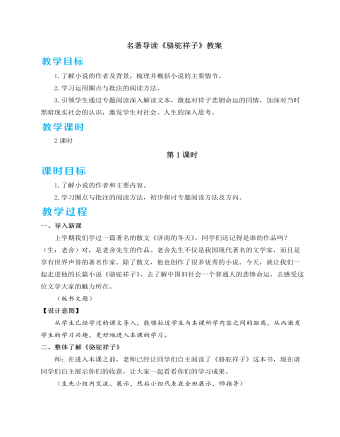
人教部编版七年级下册名著导读 《骆驼祥子》 圈点与批注教案
本环节交流的内容侧重于体验与心得,是建立在充分阅读后的再创作,也是对小说阅读方法和内容的总结性归纳和展示,需要学生有较高的阅读理解能力。三、延伸探讨《骆驼祥子》的艺术特色师:同学们,了解经典作品的艺术魅力,然后能运用到自己的写作中,是何等快乐的事啊!请你根据自己的阅读体验,概括对《骆驼祥子》这部小说艺术特色的评价。(生小组内交流、讨论,然后推荐代表在全班交流,师明确)预设 (1)结构紧密,线索分明。(2)语言朴实自然,生动明快,具有鲜明的地方色彩和浓厚的生活气息。幽默和“京味儿”语言运用熟练。(3)善于运用各种描写方法(肖像、心理、环境描写等)来表现人物的思想性格及发展变化。(4)有深厚的文化底蕴。写北京的生活,北京的车夫,北京种种的风俗人情等。在炎凉的世态中揭示地方文化。
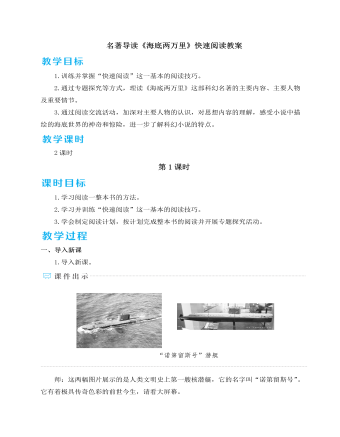
人教部编版七年级下册名著导读《海底两万里》快速阅读教案
【设计意图】这三个活动对培养学生的思维能力各有不同的目的和针对性。绘制航海路线图,讲述旅途精彩故事,可以帮助学生梳理全书的故事情节;写航海日记让学生深入到作品的情节中,对几个主人公的形象有更深入的理解;主题辩论既让学生对人物形象有更深入的思考,也有助于学生深入理解作品主题。三、活动结语师:读完《海底两万里》,相信同学们心中一定还有很多没有得到解答的疑问。尼摩船长的身世究竟是什么?他的亲人是怎么死的?他为什么要复仇?“诺第留斯号”潜艇最后的结局是什么呢?想要解开这些谜团,请看凡尔纳的另外两部科幻小说《格兰特船长的儿女》《神秘岛》,它们会带你揭开这些谜底。【设计意图】本环节旨在激发学生拓展阅读的兴趣,引导学生课外阅读凡尔纳的另外两部作品,扩大学生的阅读量。
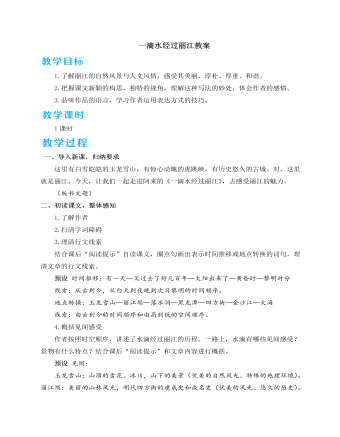
人教部编版语文八年级下册《一滴水经过丽江》教案
【设计意图】从诗意的语言入手,引导学生关注句式节奏、抒情性、叙事性、哲理性,品析语言,从而加深对文本的理解,体会作者对丽江的热爱、赞美之情,体会作者在景物描写中隐含的思想。五、总结存储1.教师总结作者虚构一个旅游者兼讲述者——“一滴水”,用它形成时空线索,串联起丽江的自然风光、历史文化、民俗风情,并着力表现景物背后的丽江的人文精神,来抒发作者对丽江古城与自然美妙融合的赞美之情,对丽江的醇美、和谐、沉静的赞美之情,对传统与现代文明和谐交融的赞美之情,对自然万物的热爱和生命平等的意识。诗意的语言中,有强烈的抒情,有厚重的历史感,有深邃的哲思。这“一滴水”折射出的,是阿来的思想、灵魂。2.布置作业(1)模仿本文的写法,写一篇不少于600字的随笔,选择一个恰当的视角,跨越时空,全面多角度展现家乡的自然风光、历史文化、风土人情。(2)课外阅读阿来的《大地的阶梯》,体会融景物、历史、感悟、思考于一体的游记风格。
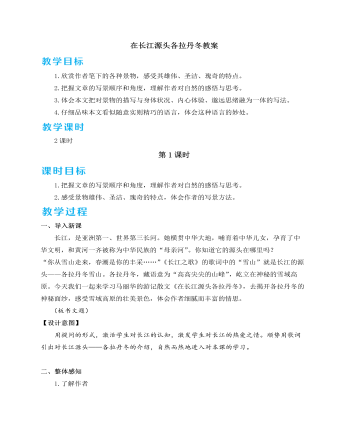
人教部编版语文八年级下册《在长江源头各拉丹动》教案
预设 第一组:(1)语言精准又生动形象,首先用长句总写各拉丹冬的变化多端,然后接连用短句,简笔勾勒各拉丹冬巍峨高大、棱角分明的特点,张弛有度,富有音乐美感。(2)用语精简而准确,形象性强,短促的句子节奏,很好地表现出冰体形状之多令人目不暇接,最后部分节奏放缓,形成一种张弛有度的音乐美,让句子又融入段落主体比较舒缓的节奏中去。第二组:(1)将自己的身体不适比喻为“小震”“大地震”,描写自己由于病痛而行动迟缓的“犹如霹雳舞的‘太空步’”,幽默之中,透露出作者乐观、坚强的精神和对探险事业的热爱。 (2)用“分外利落”形容自己拍摄冰山时跌倒骨裂的情景,好似没有痛苦一般。这幽默调侃之中,透露出作者乐观、坚强的精神。第三组:(1)“眩晕”原指一种症状,感觉到自己或周围的东西旋转,这里指“浩浩苍苍”的美景令人目不暇接,令人不知该看什么;“卖弄”原指有意显示、炫耀,含贬义,这里指大自然的无穷创造力在各拉丹冬展现得淋漓尽致。
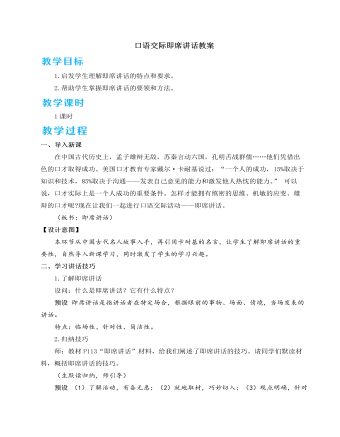
人教部编版语文八年级下册口语交际即席讲话教案
预设 示例:班上分享个人读书经验大家好!既然今天是交流读书体会,那么,我想结合自己的读书体会和大家聊聊读书。一个爱读书的民族,必定是一个文化素质较高的民族;一个爱读书的人,也必定是一个文化素质较高的人。读书能开阔我们的视野,提高我们的写作水平;读书能提升自身修养,丰富我们的人生底蕴。读书是我们精神的呼吸,能让人保持平淡的心境,变得博爱而无私。为了让我们的生活和心灵变得轻盈一些,我们需要读书。那么,应该怎样读书呢?其一,要择书而读。需要的才是最适合的,读适合的书才能有良多收获。如果没有特别需要的书要读,可以读经典。经典是经过岁月沉淀下来的人类智慧的结晶,可以让我们触摸先贤的思想,以充实自身。其二,要读而有术。要对好书反复品味,将其内化吸收,然后进行批判性阅读,有自己的思想主张和拓展探究价值判断;在读书过程中与作者进行辩论,最后形成自己的思想体系,为我所用,而不是让自己的脑袋成为别人思想的“跑马场”。







